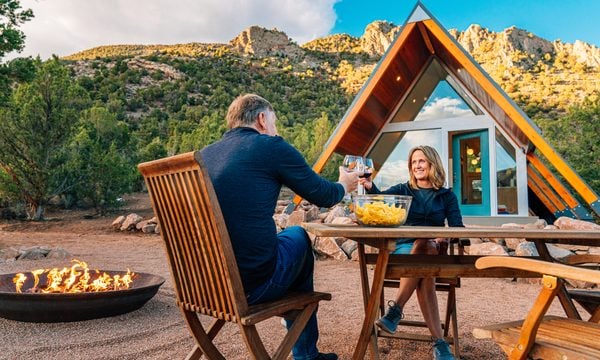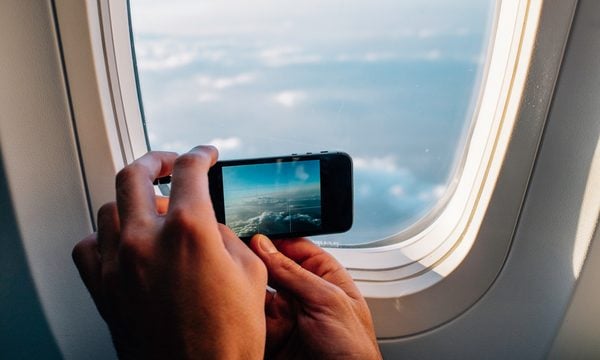Airbnb vs. Hotels: Which Is Better for Your Next Trip?
Each has something to offer, just know what you want to get out of your stay before deciding.

Many or all of the products on this page are from partners who compensate us when you click to or take an action on their website, but this does not influence our evaluations or ratings. Our opinions are our own.
We all travel for different reasons and with different expectations depending on where we are headed. Perhaps a family vacation means you want to have kitchen and dining space. A business trip to a big city could put a comfortable bed and deep soaking tub at the top of the priority list.
When deciding between an Airbnb or a hotel, understanding what you want out of your accommodations can make your choice easier, especially when price and location are equal.
Here is some insight that can guide your thinking if you're debating between booking an Airbnb or a hotel stay.
Accommodation types
When it comes to what accommodations can offer, Airbnb will often come out ahead for a variety of travelers, including self-sufficient families and digital nomads.
Airbnb is the biggest home-sharing service in the world, connecting private homeowners with people looking to rent their place for a specific period of time. It offers standalone homes, shared spaces and some hotel rooms. All of these stays are searchable using an online tool similar to most hotel brands, where you search by destination and price range.
In practice, the residential units of Airbnb aren't that much different than a hotel. Like hotel rooms, these spaces provide a place to sleep, host different guests on a regular basis and are cleaned between uses.
But there are some advantages with Airbnb that hotels cannot always easily match, at least not for the same price point. Hotels are a far more traditional concept, with guest rooms and occasional suites. Airbnbs, on the other hand, typically offer residential-style amenities like living rooms, kitchens, dining rooms, laundry facilities and, in some locations, a private place to park your car. Sure, hotel suites can match some of these amenities, but they often carry a surcharge over the price of a standard room.
Similar to some hotels, Airbnb can even offer long-term stay discounts. This can be especially helpful if you're booking a stay for several weeks or months. While extended stay brands in the hotel industry are meant to target this customer, they still lack the more spacious comforts of some residential Airbnb properties.

» Learn more: Hotel chains and their brands
Quality
There are always outliers, but hotels have far more oversight than Airbnb. This is a primary reason why hotels top Airbnb when it comes to quality.
Hotels have 24-hour staff available to manage the general operation. During a hotel stay, you have immediate access to these workers — which isn't always the case with Airbnb. Problem with the swimming pool or the WiFi? Hotel staff are on it. Airbnb requires contacting a host, and the lag time can be frustrating.
In general, hotels offer the option for daily housekeeping while Airbnbs don't. They also don't charge an extra fee for this service. Many Airbnbs tack on cleaning fees that aren't built into the rates.
Airbnb does have a property designation called Airbnb “Plus,” which signifies that it has sent someone to personally vet the property. For first-time users or those that prefer a bit more quality control, “Plus” properties are the way to go.
» Learn more: Don’t let hidden hotel fees spoil your stay
Flexibility
Hotel cancellation policies are typically consistent across the entire company. Whether you book with the St. Regis or the Springhill Suites (both Marriott brands), you can expect the same policy. Plus, many hotels have the option of a nonrefundable rate or an increased rate with more flexibility.
When you book with most vacation rental sites (including Airbnb), owners set their own cancellation terms. That means Airbnb leaves it on you to make sure you book with an owner whose cancellation policy is up to snuff. (You can read up on each cancellation policy on the main page of each listing.)
Airbnb does offer a filter that allows you to weed out tough cancellation policies. To use it, set the filter to "flexible" (which allows for a full refund of the nightly rate one day prior to arrival) if there’s a chance you might cancel.
Vacation rental site Vrbo’s cancellation policy is even trickier to navigate than Airbnb’s. Like Airbnb, Vrbo hosts determine the cancellation and refund policies. But unlike Airbnb, which allows hosts to choose from a few preset policies, Vrbo hosts can create “custom” policies. That means you must read the fine print on each listing. That doesn’t necessarily make Vrbo rentals less flexible, but its policies are generally harder to understand.
And, there’s a chance a vacation rental host may cancel on you. If they do, there’s no guarantee you’ll get a full refund; Airbnb says "you may be eligible for a full refund." Not to mention, you could end up stranded with no place to stay.
Ability to stay for free
The cost difference between a hotel room and an Airbnb can vary depending on the location, amenities offered and time of year. The rule of “supply and demand” applies, as with other things in life.
» Learn more: How to earn or redeem points on Airbnb stays
What if you're trying to pay with something other than actual cash? While it is possible to earn or redeem points and miles on Airbnb stays, it’s not the same (and likely won’t be as lucrative) as paying with a hotel co-branded credit card and participating in a hotel loyalty rewards program.
Add in any benefits received from elite status, like complimentary breakfast or room upgrades, and hotels can steal the show when it comes to value.
Since Airbnb is often considered a travel purchase, you may be able to use certain credit card points as a statement credit to cover the cost of your stay. Even some airlines, like Delta and British Airways, offer a way to earn miles when booking an Airbnb. Still, this pales in comparison with the outsized value that many hotel loyalty programs can provide.
Should I stay in an Airbnb or hotel?
Both hotels and Airbnb offer similar cancellation policies. If you're looking for a more unique or extended stay with more facilities, Airbnb will give you plenty more attractive options than most hotel chains. However, hotels are a safer bet when it comes to quality and the ability to save money in the long run.
The final call is up to you and what you want out of your stay. Fully understanding what’s being offered before showing up at the door is one of the best ways to mitigate disappointment.
These days, there is often the choice between an Airbnb and a hotel no matter where you’re traveling, giving everyone the flexibility they want and need.
How to maximize your rewards
You want a travel credit card that prioritizes what’s important to you. Here are some of the best travel credit cards of 2026:
- Flexibility, point transfers and a large bonus: Chase Sapphire Preferred® Card
- No annual fee: Wells Fargo Autograph® Card
- Flat-rate travel rewards: Capital One Venture Rewards Credit Card
- Bonus travel rewards and high-end perks: Chase Sapphire Reserve®
- Luxury perks: American Express Platinum Card®
- Business travelers: Ink Business Preferred® Credit Card
Article sources
NerdWallet writers are subject matter authorities who use primary,
trustworthy sources to inform their work, including peer-reviewed
studies, government websites, academic research and interviews with
industry experts. All content is fact-checked for accuracy, timeliness
and relevance. You can learn more about NerdWallet's high
standards for journalism by reading our
editorial guidelines.
Limited Time Only: Earn $1,000 Toward Travel!
Capital One Venture Rewards Credit Card 
Travel

For a limited time, the
Capital One Venture Rewards Credit Card is offering new cardholders an especially rich bonus: Enjoy $250 to use on Capital One Travel in your first cardholder year, plus earn 75,000 bonus miles once you spend $4,000 on purchases within the first 3 months from account opening - that’s equal to $1,000 in travel!
More like this
Related articles








